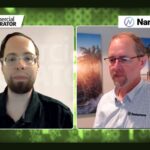Marsh brought a focus on unified communications in the enterprise market to Carousel, which didn’t have a sales team in New England at the time. Since Marsh joined the company, Carousel has grown about 120 to 130 percent year over year.
He led the company’s growth into upstate New York, New York City and into the Mid-Atlantic and eventually to a national sales and engineering footprint. The firm has moved into the data business in the past 10 to 12 years.
“Technology used to change every three years,” says Marsh. “Now it’s every 12 months or even less.”
“It’s a huge accomplishment” for Carousel to have reached the half-billion annual revenue level, he says, but the company isn’t focused on where it ranks in terms of the overall industry. “We’re completely aligned and can do something in five minutes that might take another company two hours,” he says. “We had that inner chutzpah that helped us get to this level. You’ve got to do whatever you can to win the business.”
Bringing Talent Together
The Atrion deal was the ninth for Carousel in the past 15 years, and helped them build the roster of manufacturers they represent to about 50. It wasn’t the first major change for Carousel during its first quarter-century.
“We’ve been through a couple of transitions,” says Gardner, pointing to the decision to start adding partners as the company continued to grow. Gardner has been through enough acquisitions at this point that he thinks he knows what makes them successful.
“We can say ‘1+1=3’ as much as we want but there’s a lot more to it than that,” he says. “It’s important that the CEO or the owner stays with the business when we acquire it.”
That’s because Carousel is acquiring not only the company and the name but also the philosophy of the business, especially in a deal as large as the Atrion one. Then again, don’t expect Carousel to be adding small companies to its portfolio. “We’re not looking for a project,” says Gardner.
Gardner and Hebert spent several months after the deal was announced looking at back-office operations, unifying service offerings and bringing the two companies together.
“It’s hard to be a small integrator these days and be very good at it,” says Hebert. “Clients want us to be able to do more for them.”
On top of that, “manufacturers really want to deal with the big guys,” says Gardner. “We’re not pushing a single brand. The quicker we can get our sales team thinking that way, the faster we can have the success we expect,” he says. “The question we ask today more than any other when we don’t win a job is, ‘why did we lose?’”
The biggest challenge Carousel faces in 2017 and beyond is “staying ahead of all of the innovations,” says Gardner. They’re able to overcome that “by having the best technology partner ecosystem,” he says.
Marsh is proud of how Carousel has diversified its portfolio offerings. “We don’t want to be a lifestyle integrator,” he says. “It’s tough to be single-threaded in this business. Clients want us to touch all of these technologies. Our whole vision is we can do so much more than a company that focuses on a particular niche.
“You need the visionaries, the engineers, the financial people and the people who are going to buy in. We have a very driven culture,” says Marsh.
A Whole New World
Gardner and Hebert have noticed a dramatic shift in how they must meet their clients’ needs in recent years, and that shift has helped Carousel elevate to a company with customers in 86 countries.
“It’s about managed services,” says Gardner. “We can be in Rhode Island serving someone in Hong Kong. The quicker you can bring everyone together, the better.”
Adds Hebert: “The bulk of what we do is happening more remotely than in the past. There aren’t a lot of companies with the reach and sophistication we have. What we can offer our customers is completely different than [before Atrion’s sale to Carousel].”
















